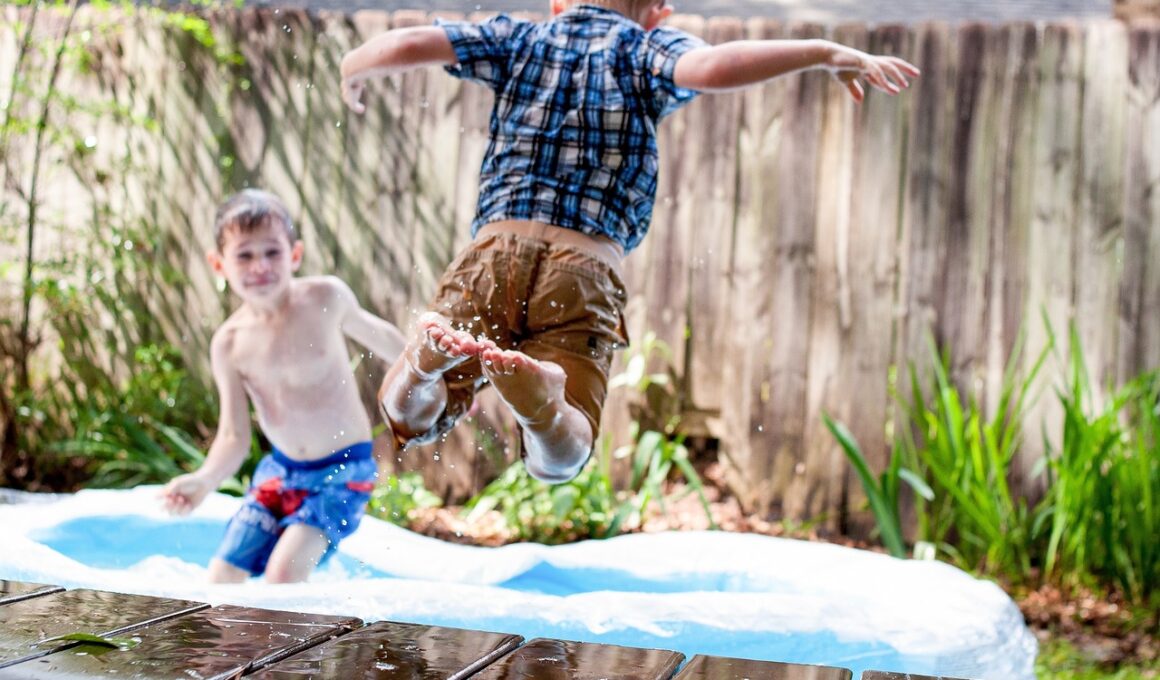Swimming Challenges for Kids: Making Fitness Fun
Swimming is an enjoyable activity that can significantly benefit children’s physical health while fostering a love for fitness. Introducing swimming challenges not only compels kids to engage actively but also creates an exciting environment. One fun challenge is the “Swim a Distance” goal, encouraging children to swim a predetermined distance or duration, depending on their capability. This fosters a sense of achievement as they aim to go further each time. Pair this with a reward system such as stickers or a small prize to enhance motivation. Another idea is the “Relay Race” challenge, which can be executed with friends or family. Organizing teams and giving them a short distance to swim creates a competitive yet exhilarating atmosphere. Children cheer each other on, helping to develop teamwork and social skills. Additionally, you could create themed swimming days such as “Superhero Swim Day,” allowing kids to embody their favorite characters while they swim. Engaging in these challenges elevates the swimming experience and encourages continuous participation in fitness activities. With enthusiasm, children can build both swimming skills and a love for active pursuit, making health a priority in their lives.
Different Types of Swimming Challenges
There are a variety of swimming challenges that can be tailored to different age groups and abilities. For instance, the “Underwater Swim” challenge is exhilarating. In this challenge, children attempt to hold their breath and swim underwater for a specific distance. It’s not just thrilling; it helps enhance lung capacity while empowering kids to conquer their fears. Another fun challenge is the “Swimming Obstacle Course,” which can be created using pool noodles, hoops, and floating devices. Kids navigate this course, enhancing their agility and coordination. For more seasoned swimmers, consider a “Timed Swim Challenge,” where children compete against the clock to improve their swimming speeds. Tracking their progress over time cultivates a growth mindset, showing that consistent effort yields results. Parents can also participate, turning it into a family affair! Remember to set achievable goals tailored to each child’s skill level, ensuring everyone can participate. Each of these challenges motivates kids to practice their swimming skills while enjoying the water thoroughly. Incorporating a variety of challenges ensures that every child finds an exciting avenue to explore and grow within the realm of swimming.
Positive reinforcement is crucial when it comes to encouraging participation in swimming challenges. Supporting kids as they tackle each challenge helps build their self-esteem, which in turn improves their willingness to engage in more complex challenges. Celebrate small victories, regardless of how minor they may appear. A simple high five or a heartfelt word of praise can motivate your child immensely. Consider introducing a “Leader Board” where kids’ names are displayed next to the challenges they have completed. This visual acknowledgment acts as an inspiring reminder of their achievements and can instill a sense of friendly competition. Ensure that the environment remains positive and focuses on personal improvement rather than solely on winning. Encouraging kids to set personal records teaches them the value of hard work, resilience, and determination. Remember, swimming isn’t just a sport; it’s a life skill. Highlight the importance of swimming safety while also allowing kids to feel comfortable and secure in the water. Overall, making fitness fun through swimming challenges will foster an atmosphere of trust and growth, ensuring children remain excited about their fitness journey.
Building Social Skills Through Swimming
Incorporating swimming challenges into your child’s routine does more than just enhance fitness; it aids in developing essential social skills. Participation in group challenges fosters camaraderie and teamwork, particularly in environments such as swim teams or lessons. Engaging with peers enhances communication skills and offers an opportunity for children to form friendships based on shared interests. Activities like team relays or group swims create bonds as they collaborate and compete, understanding the importance of supporting one another. These strong foundations can impact their social growth beyond the pool. Challenging children to help peers improve their skills not only builds empathy but also reinforces their understanding of swimming techniques. These partnerships allow for valuable feedback and guidance, enhancing overall skill levels. As children become more assured in their swimming ability, they may also show willingness to help their classmates, promoting a culture of mutual respect and encouragement. Learning to swim together and work through challenges cultivates not just great swimmers but well-rounded individuals. These benefits can pave the way for future social interactions, teaching them how to navigate relationships with kindness and support.
Incorporating varied swimming challenges can also address different fitness components, such as strength, endurance, and flexibility. For instance, a challenge centered around mastering specific strokes can significantly improve technique and strength. Setting a goal to successfully perform the front crawl, breaststroke, backstroke, or butterfly can help kids learn the various swimming styles. Alongside regular practice, you might consider an “Endurance Swim Challenge,” where children incrementally work to swim longer distances week after week. This approach not only builds physical capabilities but encourages resilience. Flexibility can be enhanced through fun stretches in warm-up routines, ensuring that kids stay limber and free from injuries, complementing their swimming practice. Implementing dry-land workouts can also contribute to overall fitness. Easy exercises like jumping jacks or core strengthening routines can enhance swimming performance. By combining swimming with general fitness elements, children are likely to develop a well-rounded understanding of health and wellness. Establish a culture where swimming is seen as a fun activity rather than a mere workout, sparking excitement in participating in varied swimming challenges that cater to their development.
Family Involvement in Swimming Challenges
Getting the whole family involved in swimming challenges can yield incredible benefits. When family members participate together, it creates a supportive environment where children feel encouraged. Organizing family swim days that incorporate fun races, obstacle courses, or themed swims can make fitness a wonderful experience everyone looks forward to. Additionally, these challenges foster closer relationships, helping each member bond over shared interests. Families can create individual challenge cards, holding various swim targets personalized for family members based on their skill levels and swim goals. These cards can bring friendly rivalry among family members, inspiring each other to push their limits while having fun. Bringing families together this way also emphasizes the significance of staying active and healthy. To spice things up further, consider presenting fun awards at the end of each month. These can be based on different factors such as improvement, effort, or enthusiasm. Infusing creativity while focusing on fitness encourages participation and strengthens familial connections. Family involvement presents opportunities to model healthy habits, making swimming a regular combined activity that encourages laughter, skills development, and quality time spent with loved ones.
Ultimately, swimming challenges provide an exciting avenue for kids to embrace fitness while gaining valuable life skills. Creating a diverse tapestry of challenges will cater to children’s interests, making every pool session exciting and engaging. This structure not only empowers kids to develop physical competency but fosters personal growth, collaboration, and creativity. Parents’ involvement is crucial in motivating their children through challenges, ensuring an enriching poolside experience. The importance of recognizing milestones cannot be overstated; it will leave children feeling accomplished and motivated. Regularly reassess swimming challenges, aligning them with the child’s progress and preferences, enabling them to feel part of a dynamic journey. Beyond the strokes and distances, swimming helps instill critical values like sportsmanship, resilience, and teamwork. It acts as a foundational skill that children carry onto future endeavours, promoting a lifelong appreciation for fitness. Making fitness fun transforms swimming from a simple activity into a delightful adventure, ensuring kids develop a love for the water. With various swimming challenges, families create memories and build relationships centered around health, happiness, and a shared commitment to well-being.


